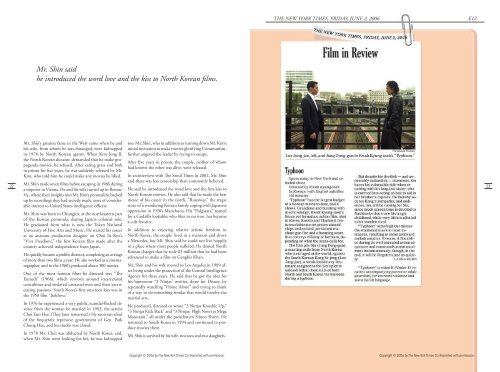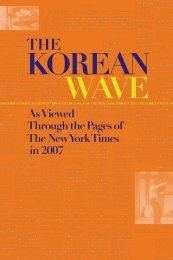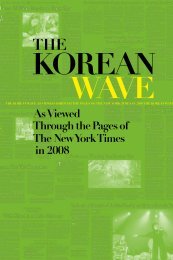The Korean Wave 2006 - Korean Cultural Service
The Korean Wave 2006 - Korean Cultural Service
The Korean Wave 2006 - Korean Cultural Service
Create successful ePaper yourself
Turn your PDF publications into a flip-book with our unique Google optimized e-Paper software.
<strong>The</strong> New York Times, friday, june 2, <strong>2006</strong><br />
E12<br />
Mr. Shin said<br />
he introduced the word love and the kiss to North <strong>Korean</strong> films.<br />
22<br />
Mr. Shin’s greatest fame in the West came when he and<br />
his wife, from whom he was estranged, were kidnapped<br />
in 1978 by North <strong>Korean</strong> agents. When Kim Jong Il,<br />
the North <strong>Korean</strong> dictator, demanded that he make propaganda<br />
movies, he refused. After eating grass and bark<br />
in prison for five years, he was suddenly released by Mr.<br />
Kim, who told him he could make any movies he liked.<br />
Mr. Shin made seven films before escaping in 1986 during<br />
a stopover in Vienna. He and his wife turned up in Reston,<br />
Va., where their insights into Mr. Kim’s personality, backed<br />
up by recordings they had secretly made, were of considerable<br />
interest to United States intelligence officers.<br />
Mr. Shin was born in Chungjin, at the northeastern part<br />
of the <strong>Korean</strong> peninsula, during Japan’s colonial rule.<br />
He graduated from what is now the Tokyo National<br />
University of Fine Arts and Music. He started his career<br />
as an assistant production designer on Choi In Kyu’s<br />
“Viva Freedom!,” the first <strong>Korean</strong> film made after the<br />
country achieved independence from Japan.<br />
He quickly became a prolific director, completing an average<br />
of more than two films a year. He also worked as a cinematographer,<br />
and in the 1960’s produced about 300 movies.<br />
One of the most famous films he directed was “<strong>The</strong><br />
Eunuch” (1968), which revolves around incarcerated<br />
concubines and enslaved castrated men and their excruciating<br />
passions. South Korea’s first onscreen kiss was in<br />
the 1958 film “Jiokhwa.”<br />
In 1976 he experienced a very public, scandal-flecked divorce<br />
from the woman he married in 1953, the actress<br />
Choi Eun Hee. (<strong>The</strong>y later remarried.) He soon ran afoul<br />
of the frequently repressive government of Gen. Park<br />
Chung Hee, and his studio was closed.<br />
In 1978 Ms. Choi was abducted by North Korea, and,<br />
when Mr. Shin went looking for her, he was kidnapped<br />
too. Mr. Shin, who in addition to turning down Mr. Kim’s<br />
initial invitation to make movies glorifying Communism,<br />
further angered the leader by trying to escape.<br />
After five years in prison, the couple, neither of whom<br />
had known the other was alive, were released.<br />
In an interview with <strong>The</strong> Seoul Times in 2002, Mr. Shin<br />
said there was less censorship than commonly believed.<br />
He said he introduced the word love and the first kiss to<br />
North <strong>Korean</strong> movies. He also said that he made the best<br />
movie of his career in the north, “Runaway,” the tragic<br />
story of a wandering <strong>Korean</strong> family coping with Japanese<br />
oppression in 1920’s Manchuria. His “Pulgasari,” named<br />
for a Godzilla lookalike who likes to eat iron, has become<br />
a cult favorite.<br />
In addition to enjoying relative artistic freedom in<br />
North Korea, the couple lived in a mansion and drove<br />
a Mercedes, but Mr. Shin said he could not live happily<br />
in a place where most people suffered. He denied North<br />
<strong>Korean</strong> charges that he stole $3 million that he had been<br />
advanced to make a film on Genghis Khan.<br />
Mr. Shin and his wife moved to Los Angeles in 1989 after<br />
living under the protection of the Central Intelligence<br />
Agency for three years. He said that he got the idea for<br />
his humorous “3 Ninjas” movies, done for Disney, by<br />
repeatedly watching “Home Alone” and trying to think<br />
of a way to do something similar that would involve the<br />
martial arts.<br />
He produced, directed or wrote “3 Ninjas Knuckle Up,”<br />
“3 Ninjas Kick Back” and “3 Ninjas: High Noon at Mega<br />
Mountain,” all under the pseudonym Simon Sheen. He<br />
returned to South Korea in 1994 and continued to produce<br />
movies there.<br />
Mr. Shin is survived by his wife, two sons and two daughters.<br />
23<br />
Copyright © <strong>2006</strong> by <strong>The</strong> New York Times Co. Reprinted with permission.<br />
Copyright © <strong>2006</strong> by <strong>The</strong> New York Times Co. Reprinted with permission.





